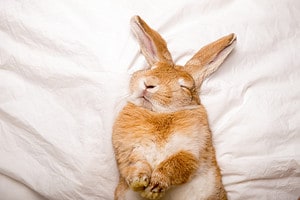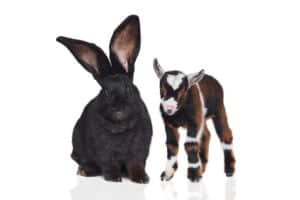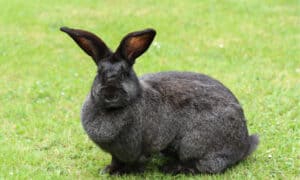“Bunny” is a nickname given to young rabbits. But did you know that a bunny’s diet is different from an adult rabbit’s? In fact, just like other young animals, a bunny eats according to its unique needs during its early stages of life. The foods a bunny eats must support its overall health and wellness in addition to helping its body develop for adulthood. Its diet from birth to the time it is fully grown also helps it develop good eating habits for the rest of its adult life.
Before diving into what bunnies eat, it is important to know more about these soft, cute, and small mammals. First, did you know that there are many species of bunnies? In fact, there are 29 species in 10 genera that live on every continent except Antarctica.
Seventeen bunny species are cottontails found in North America and South America. Of the 29 species in the world, the American Rabbit Breeders Association (ARBA) recognizes 49 breeds. These are domesticated bunnies bred for their distinct traits such as their physical characteristics, health, demeanor, and size. Most of them are capable of reaching weights ranging from 2.5lbs – 16lbs in adulthood. However, others, such as the French Lop and Angora, are capable of growing even larger.
What Do Bunnies Eat?
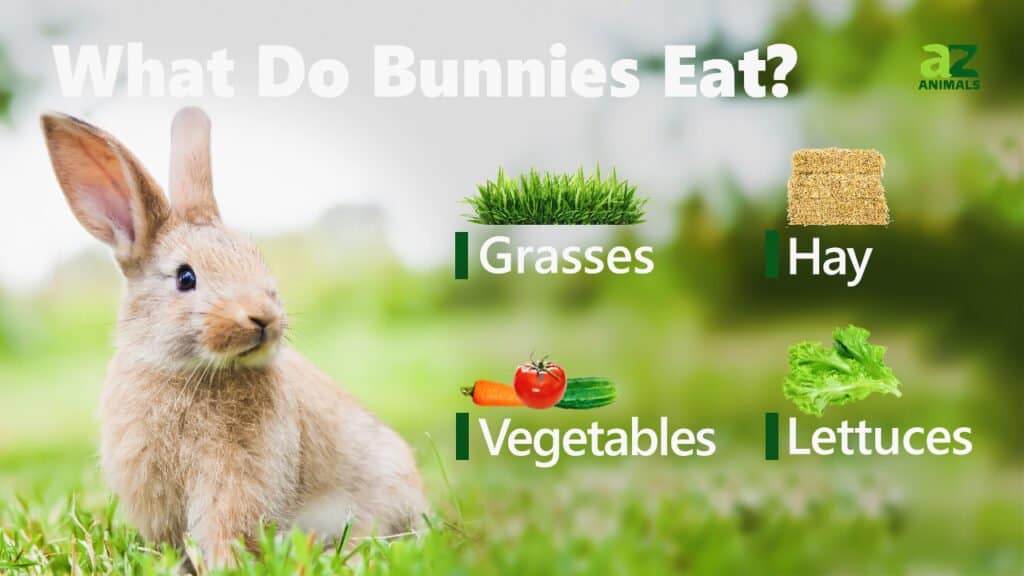
As herbivores, bunny rabbits are continuous grazers that spend most of each day eating ground-level and low-lying vegetation like hay or grass. Bunnies eat a very specific diet, though. Their health depends on not making quick changes to their foods. If bunnies eat foods they are not used to, this disrupts their digestive flora balance and can cause them to suffer gas, toxicity, sickness, and even death.
Rabbits start their lives on a diet of their mother’s milk, surprisingly taking in milk only once or twice for a total of five minutes per day. They keep nursing like this until they wean at 6 weeks to 8 weeks old. Baby bunnies add their first solid food at about 2 weeks to 3 weeks of age. These first solids usually consist of their nest hay. Then, by week 3 to week 4 of life, the bunnies eat the same foods as their mother, along with nursing her milk. Because they go through so many diet changes in these early weeks around weaning, a bunny’s digestive system is very sensitive during this time. This makes it very important for young bunnies to stay with their mother, follow her lead, and nurse until they are of weaning age.
The typical rabbit diet after weaning is grass from grazing all day. They also eat various kinds of hay. Only baby bunnies can eat alfalfa hay, however. Adult rabbits should not consume alfalfa because it contains too much protein and calcium that fully grown species do not need.
After weaning, rabbits of all ages also enjoy fresh fruit and vegetables. But feeding a bunny or rabbit too many vegetables can hurt their stomach. This is contrary to what most people believe about bunnies and rabbits enjoying a diet of mostly carrots and lettuce. They should take these foods in as treats in limited amounts and on top of a healthy diet.
Baby bunnies and fully grown rabbits in the wild eat by grazing. This is their main activity each day, from waking to sleeping. Domesticated rabbits are raised for their meat or fur and pet rabbits eat when fed by their human owners. All species of rabbits around the world eat the same basic diets of grasses and hay after weaning from their mother. The type of hay varies according to geography and availability.
What Do Bunnies Eat in Captivity vs in the Wild?
What bunnies eat in captivity differs from what they eat in the wild. Wild bunnies eat grass by grazing all day from 2 weeks of age. They continue this grazing after weaning from their mother’s milk. But domestic rabbits kept without their mothers under the age of 8 weeks need their human owners to provide them with milk formula provided by a veterinarian. This milk is a close match to the mother’s own.
From 2 weeks of age, it is also important that domestic baby bunnies eat nutritional hay pellets made specifically for rabbits. They need these along with an ongoing supply of alfalfa hay to accompany their mother’s milk or substitute formula. From 8 weeks of age, baby bunnies can eat some garden vegetables in very limited amounts.
Captive bunnies on farms or raised as pets are often overfed. This can lead to digestive problems, health problems, and weight conditions. One of the most common problems with the diets of rabbit pets is overfeeding of vegetables like lettuce and carrots. Adult rabbits are also often mistakenly fed alfalfa hay that contains too much protein and calcium for fully-grown animals. The adult rabbits eat fewer hay pellets than babies and may stop needing them altogether.
You may notice wild rabbits in the garden of your home from time to time. They enjoy snacking on vegetables when they are available to them. While it is unhealthy to feed rabbits kept as pets too many of some kinds of vegetables, wild rabbits eat only what they need. They will go back to munching on grass once they have had enough of the bounty in the garden.
A Complete List of 33 Foods Bunnies Eat
As herbivores, bunnies eat a combined diet of grasses, hay, and their mother’s milk. After they wean from milk, they live exclusively on vegetation found in the garden or in the wild and freshwater. In fact, hay makes up 80% to 90% of a rabbit’s daily diet. Ideally, this provides the fully grown rabbit with a diet of 40% fiber, 10% to 12% protein, and other nutrients.
Bunnies eat a daily diet that safely includes these 25 primary foods:
- Grasses
- Wheatgrass
- Bermuda grass
- Orchard grass
- Alfalfa grass (as a baby only)
- Oats
- Hay
- Hay pellets
- Vegetables they nibble on in the garden
- Bell peppers
- Sprouts (alfalfa, radish and clover)
- Bok choy
- Watercress
- Carrot tops
- Zucchini
- Endive
- Radish tops
- Escarole
- Brussels sprouts
- Fennel
- Lettuces
- Okra leaves
- Cucumber
- Radicchio
- Herbs
Rabbits eat fruit in limited amounts once or twice per week without any digestive problems.
Eight other foods a rabbit eats only once or twice per week as a treat include:
- Carrots
- Collard greens
- Broccoli (only stems and leaves)
- Chard
- Clover
- Dandelion greens (pesticide-free)
- Spinach
- Kale
Dried corn, nuts, and seeds are foods a rabbit should not eat, along with any foods made specifically for humans to eat.
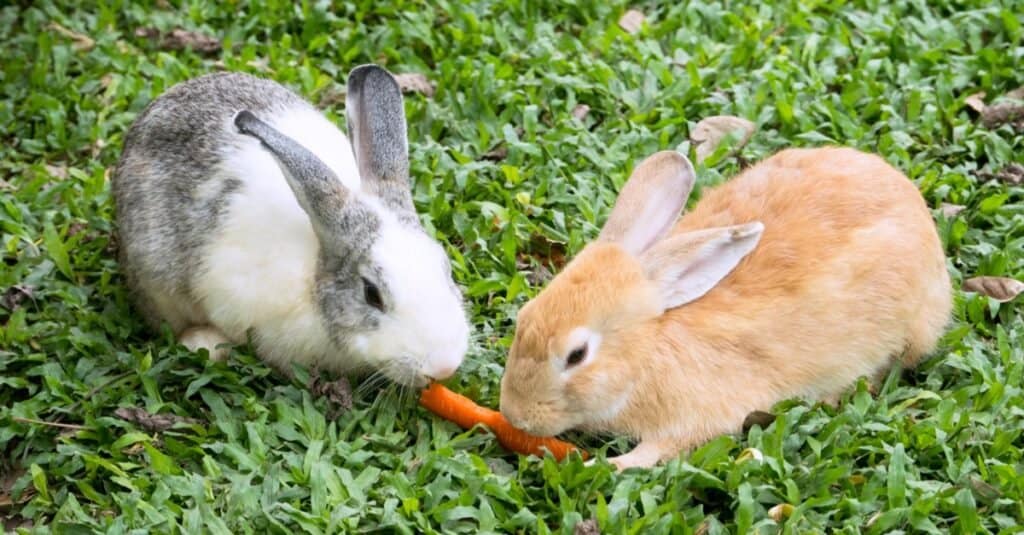
©Thor Jorgen Udvang/Shutterstock.com
What Predators Eat Bunnies?
Although rabbits eat only plant matter and are therefore herbivores, they are a favorite meal for many predators. The predators that eat bunnies include:
- Foxes
- Wolves
- Dingoes
- Wolverines
- Coyotes
- Raccoons
- Bears
- Birds of prey
- Snakes
- Dogs
- Big cats
- Domesticated cats
- Iguanas
- Komodo dragons
- Ferrets
- Weasels
- Badgers
- Stoats
- Humans
Opossums will sometimes kill rabbits without eating them.
NEXT UP…
- The Best Rabbit Foods For Your pet in 2022. If you would like to know how to feed a bunny in captivity, here is a guide.
- Bunny vs Rabbit – 3 Main Differences Is there a difference between a rabbit and a bunny? Click here to find out.
- Bunny Lifespan: How Long Do Bunnies Live? Do bunnies have a long lifespan of a short lifespan? The answer may surprise you.
The photo featured at the top of this post is © Thor Jorgen Udvang/Shutterstock.com
Thank you for reading! Have some feedback for us? Contact the AZ Animals editorial team.



